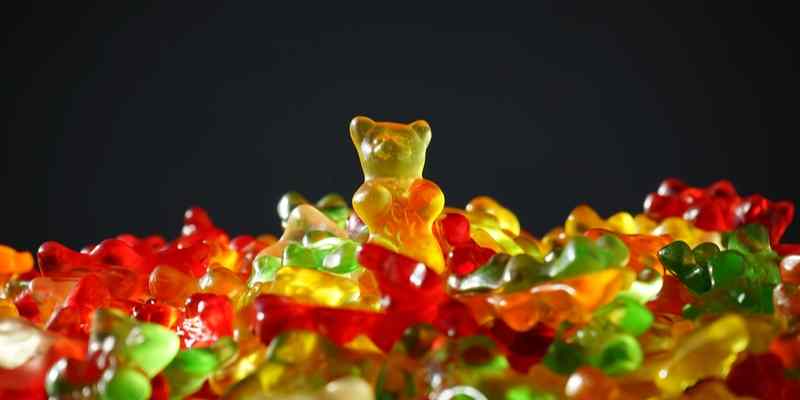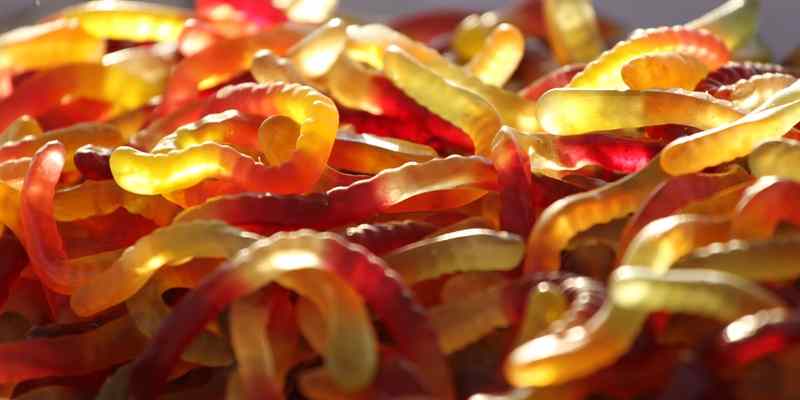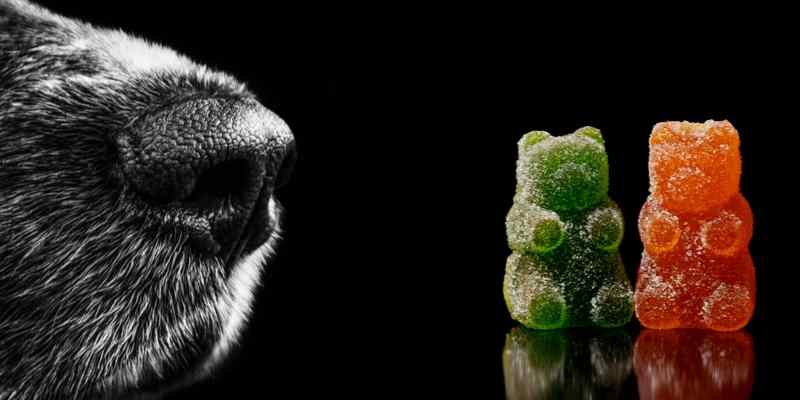Eating gummy bears can be great if you want a simple, tasty treat for yourself. But you have to wonder, is it a good idea to share this treat with your dog or not? As you can imagine, some treats are not exactly suitable for pets. So it’s vital to figure out if gummy bears have any negative impact on your pet or not. And here you have some things to keep in mind before you feed your dog any gummy bears.
Are you interested in a particular topic about gummy bears and dogs? Then use the table of contents below to jump to the most relevant section. And you can always go back by clicking on the black arrow in the right bottom corner of the page. Also, please note that some of the links in this article may be affiliate links. For more details, check the Disclosure section at the bottom of the page.
Can dogs have gummy bears?
Even though the treat seems safe, eating gummy bears is not recommended. First, traditional human gummies don’t nutrients that your pup requires for perfect health. And some of the brands will even put clearly dog-toxic ingredients, e.g., xylitol, in it. Let’s dig deeper and see what kind of nutritional value you can typically expect from those candies.


Haribo gummy bears ingredients
Among the Ingredients of Gold bears gummy candy by Haribo are corn syrup, sugar, gelatin, dextrose, citric acid, corn starch, artificial and natural flavors, fractionated coconut oil, carnauba wax, beeswax coating, artificial colors: yellow 5, red 40, blue 1.
As you can see, the lion’s share of components is not your typical healthy and natural one. Even if the human body can cope with it, it doesn’t mean that it’s as easy for dogs.

Haribo gummy bears nutritional value
According to the USDA (United States Department of Agriculture) Food Database, the 100g serving of gold gummy bears by Haribo contains 333 calories, 7.69 g of protein, 76.92 g of carbs, (48.72 g of it comes from sugar) and 0g of fat. No minerals or nutrients were spotted according to the analysis. In a nutshell, lots of empty calories and high in sugar. Not the best combination for canines.

Are gummy bears bad for dogs?
More yes than no. Even if were are talking about xylitol-free recipes, it’s not ok to offer chemical-based sugary sweets to your pet. They can lead to all kinds of dental problems and many issues that you can avoid. We recommend you to feed your pet a variety of healthy treats (or at least dog-friendly gummy bears, read on for a recipe) and not rely on gummy bears or similar candies.

My dog ate gummy bears. What’s next?
If your dog ate just a single gummy bear, there’s no reason to be concerned that much. Just make sure that you keep gummy bears away to avoid any problems in the future.
If we are talking larger quantities, the first thing you want to see is whether your dog shows any unusual signs. Those can include diarrhea, increased heart rate, vomiting, tremors, etc. If that’s the case, you need to talk with your vet right away and bring him in to be consulted as fast as possible. The quicker you do that, the higher the chances that your pet will recover quickly.

Can dogs eat gummy worms?

Just like gummy bears, gummy worms intended for human consumption. And some of those may have various artificial ingredients, including xylitol, and thus, they are not healthy for your pet.
Every formula is different and depends on the manufacturer and its business values. The primary ingredient is always gelatin, and on top of it, you have a lot of flavor and color enhancers that can be natural or artificial.
For instance this one, developed by the brand named Wholesome includes organic cane sugar, gelatin, organic tapioca syrup, organic grape juice concentrate, citric acid, lactic acid (non-dairy), ascorbic acid, natural flavors, colors added (organic annatto, organic black carrot juice concentrate, organic turmeric), organic sunflower oil and carnauba wax. Which is not that bad.
However, let’s take a close look at the product’s nutritional value. According to the USDA (United States Department of Agriculture) Food Database, the 100g serving of gummy worms contains 325 calories, 7.5.g of protein, 77.5 g of carbs (50g comes from sugars). Some brands would also add vitamins to the formula and in those cases, will indicate the relevant details on the packaging. This particular formula has 150mg of Vitamin C.
Long story short, even though the ingredients are fine, the nutritional value is still lacking. So you and your pup will be better off with treats developed with canine’s diet requirements in mind.

Gummy bear DIY recipe for dogs
If your pup still loves the funny texture of gummy bears, but you don’t wanna risk dog’s health, you can try to make those treats more dog-friendly by doing it yourself.
As a base ingredient, you can use ½ cup of bone broth suitable for dogs.
You will also need:
- half of a beet (beet is also safe for dogs),
- 1 ,
- And a handful of parsley
That amount of ingredients will make you about a hundred of gummy bears.
And here’s what you do to make it:
- Step 1. Blend beets with parsley and 1-2 teaspoons of water.
- Step 2. Separate the liquid part of the puree from solids.
- Step 3. Mix veggie liquid with gelatine and let it sit for 5 minutes.
- Step 4. Heat the broth in a pot and stir in the gelatine, till it completely dissolved.
- Step 5. Put the mixture in the bear molds (e.g., one seems to be the best and even comes with the decent dropper).
- Step 6. Place it into the fridge for a few hours or until firm.
And here you go, those are perfectly safe, and even healthy dog-friendly treats that you can store (in a fridge) for about 7-10 days.

Gummy bears for dogs. Summary
Your dog should never eat gummy bears. The candies can contain potentially toxic ingredients and are definitely lacking in nutritional value. And while this is a standard sugary treat for people, it can not be that great for pets. So, stick to less controversial and more dog-friendly treats and products instead.
Thanks for the blog graphics: Canva.com


